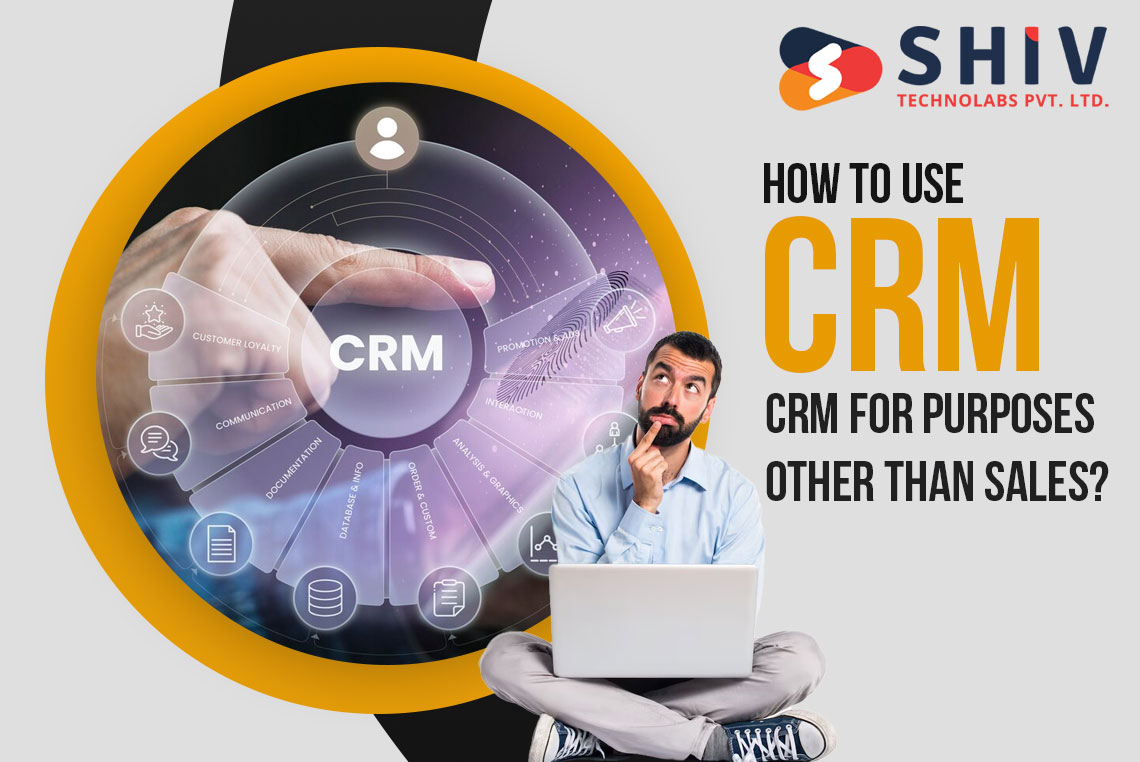Table of Contents
When your company expands, it becomes next to impossible to manually monitor a growing list of potential clients and buyers using spreadsheets and random notes in different places.
However, such a system is very time-consuming and energy-consuming, and things begin falling through the cracks like never before, exhausting your team and disappointing customers.
Can you afford to let this happen? No! That’s why you need a CRM. For a very long time, Customer Relationship Management (CRM) software has been used to manage sales processes and customer interactions. However, it goes beyond sales alone.
Through CRM systems’ numerous features and capabilities, companies can exploit several avenues to enhance their operations and improve client associations across different branches. This post highlights five creative ways to use CRM beyond sales that will change how organizations manage their relationships and processes. But before that, let’s start from scratch.
Table of Contents:
3) 5 Ways to use CRM for purposes other than sales
What is CRM?
CRM is a technology-oriented marketing strategy that businesses use to control their interactions with potential customers and clients. It is intended to collect customer data for better services, more sales and loyalty fostering. In one CRM system, all customer details such as telephone numbers, purchasing files and ways of communication can be kept.
Consequently, these specifics may be useful for corporations in their drives to personalize marketing, increase the effectiveness of sales approaches, and improve customer engagement. Besides this CRM can also integrate with other business tools like email marketing platforms and analytical software that give a comprehensive view of all interactions across various channels where continuous monitoring of consumers can take place. Customer relationship management (CRM) can help create stronger customer relationships leading to increased profitability.
Benefits of CRM
# Better Customer Experience
Knowing a lot about your potential customers makes it easier to give them a positive buying experience. For instance, having an overview of every blog post, email, and ebook they have opened/ read, plus relevant details like the size of their organization, location, and vertical, will give you an advantage. You can personalize your messaging & provide more value from the start.
Also Read:- Best ERP and CRM Development Services
# Higher Productivity
CRM can automate call and activity logging, reporting, deal creation, etc. The less time reps spend on administrative work, the more hours they have to get in front of prospects. Your revenue will increase proportionally.
# Increased Collaboration
For a sales manager, seeing how and when her salespeople contact buyers and follow up with them can happen instantly. If an account executive (AE) wants to quickly get information about a deal that has been prospected and qualified by his sales development rep (SDR), he can do so.
Also Read:- How to Build Your Own Custom CRM Software From Scratch
When a group member goes on vacation or falls sick, the rest can learn their best practices and even substitute for one another. In general, this improves representatives’ efficiency within CRM.
# Greater Insights
Stop asking yourself how your sales reps are doing. A CRM tool will provide you with a broad and detailed perspective on the level of performance, outlining both average revenue per salesperson and conversion rates by deal stage across the entire team, as well as the average deal size and deal velocity—and that’s just skimming the surface. Think about what insights like this could mean for your business.
5 Ways to use CRM for purposes other than sales
CRMs possess the potential to replace various supplementary tools and merge the entire business process into a unified software platform. By fully utilizing CRM, users can greatly simplify their workflow processes. Let’s examine some of the less famous CRM use cases besides sales.
# Analyze marketing activities
Although CRMs keep track of personal data, CRMs simultaneously serve as an efficient means of gauging the success of your marketing team. Therefore, using a CRM, it is possible to evaluate a marketing campaign’s performance, coverage, and other indicators. Consequently, this will reveal how much impact the conversion rate among your target audience the campaign has had by providing information about the number of leads who responded and whether or not they were converted into customers—hence creating ground for the company to identify and adopt the most effective ones.
Also Read:- Top-notch Odoo Customization Services
Moreover, this data will also help other departments make decisions regarding the campaign’s results and range, including helping sales reps match their customer communication approach with their interaction with marketing campaigns.
# Provide customer support
With a CRM, customer support can have a centralized dashboard to keep track of contacts and details about their clients. This way, support agents can answer questions, fix problems, talk to clients, and resolve issues, improving customers’ general experience. As a result, it makes the company’s workflow easier by allowing relationships to develop between them.
# Assess team performance
CRM may serve as an excellent company’s internal performance tracker and provide live updates of a client’s work, reflecting the sales agent’s performance. By assessing the agent’s critical success indicators (CSIs), you can measure how well his/her results align with your company’s strategic goals. If any deviations occur, you can take immediate remedial actions before the end of the month or quarterly reviews.
# Delivery management system
Companies always use their software to plot these movements of goods. However, a CRM can also serve as a delivery management tool. Follow your delivery process and get current alerts on how the deliveries perform. This can then be fitted into the CRM customer records, thus linking contacts to their specific delivered items. Furthermore, you can locate the point of delivery and pick-up points by adding a map using widgets. The effect of this is to have one piece of software that brings together all data about individual customers.
# Product development
Because CRMs assist in developing and managing the products, they are considered an expansion of customer support. As a result, product developers should be aware of this information so that they can take action as soon as possible. This data helps managers to take corrective actions towards their merchandise and link them to clients’ needs. Thus, it is vital for CRM to integrate different departments linked with business processes.
# Conclusion
CRM software is an aspect that opens up more than just sales doors for any organization. The tools offered by CRM will, therefore, enhance customer service, simplify marketing processes, encourage innovation, and improve relationships with partners and employee engagement. This enables businesses to improve customer connections by leveraging CRM across different departments and functions, gaining a market advantage, and optimizing their operations.
Also Read:- Impeccable Zoho Customization Services
Undoubtedly, the role of CRM in determining business strategy and driving success will become even broader because organizations are already appreciating the multiple benefits of this innovative system.
# Frequently Asked Questions
- Can small businesses be advantaged by using CRM beyond sales?
Yes, CRM systems offer scalable solutions which perfectly suit the needs of companies of various sizes. Small businesses can employ CRM for several purposes including customer care services, marketing and partner management among others to improve their operations as well as drive growth.
- How can a business ensure the successful implementation of non-sales CRM?
The proper execution of non-sales CRM requires a plan, consideration of organizational objectives and training employees on how to use it effectively. In order to get the best out of CRM in businesses, workflows and configurations must be personalized according to specific business needs and supported with maintenance as well as ongoing support.
- Are there other uses of CRM in industries other than sales?
Yes, there are other sectors apart from sales where CRM can be altered for customization. For instance, medical institutions may apply CRM systems to manage patient relations as schools use them in regards to student engagement or alumni relations. Therefore, due to its adaptability and flexibility, CRM is used in different industries.























